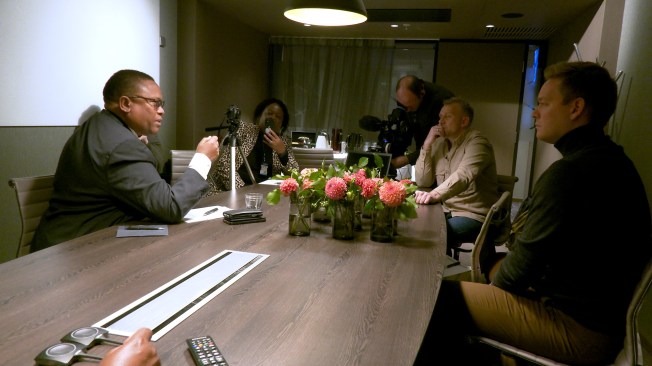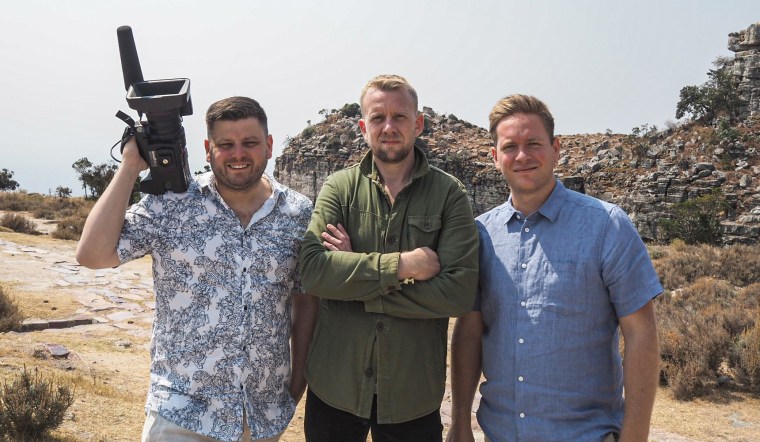When in March of this year a neighbor alerted Helgi Seljan, an investigative reporter for Iceland’s public broadcaster Ríkisútvarpið (RÚV), that she had seen someone lurking around his house, he was alarmed, he told CPJ in a video interview.
Seljan said that the neighbor recognized the alleged lurker as Jón Óttar Ólafsson, a former police officer turned private detective. Ólafsson had occasionally appeared in social media videos by Icelandic fishing giant Samherji to defend the brand against claims of corruption in Seljan’s investigative reporting.
In November 2019 RÚV reported in partnership with Icelandic news website Stundin and Qatari broadcaster Al-Jazeera that the company had allegedly bribed officials in Namibia with payments equating millions of dollars in exchange for the right to fish.
In the past, Ólafsson had texted Seljan criticizing his reporting on the Namibia case. “Your lack of judgment is incredible!” read one text message, Seljan told CPJ via video call.
Fielding criticism via text was one thing but having the man behind the criticism show up at his home was a “game changing moment,” Seljan told CPJ. “I have never thought that Samherji will go as far in its campaign and harass me and my family personally.”
By then, for more than a year, Samherji had waged a campaign to discredit Seljan and his colleagues at RÚV’s investigative TV show, “Kveikur.” In statements on its website, the company accused journalists of “unethical practices,” “distortion of facts,” and of acting out of a desire for “personal revenge.” In videos published on its YouTube page it claimed “dishonesty” on the part of the journalists, and accused Seljan of tampering with a key document used in his reports. The company also filed a barrage of ethics complaints with the broadcaster over the journalists’ posts on social media and even tried to manipulate a journalist union election to prevent an RÚV reporter from taking the helm.
The company’s actions are “extremely serious,” said RÚV news director Rakel Thorbergsdóttir in an email to CPJ, and “can in no way be justified or explained by Samherji as some kind of response to journalistic work.”
In emails to CPJ, Samherji deputy CEO Margrét Ólafsdóttir denied that the company had harassed the journalists, characterizing Samherji’s statements and social media posts as “freedom of speech.” She said that Ólafsson “worked from time to time on concrete projects” for the company but “these projects have never involved harassment or bullying of Helgi Seljan.” Reached by CPJ via phone, Ólafsson said that he had never showed up at Seljan’s private home; he apologized for some of his text messages to the journalist, Ólafsson told CPJ in a follow up email. (His apology was also published by Icelandic news site Kjarninn.)
According to RÚV director general Stefán Eiríksson, who spoke with CPJ via email, Samherji never asked for a correction to “Kveikur’s” reporting in the Namibia case. Asked about this, Ólafsdóttir did not directly reply to CPJ’s question but only said that “we have lost all faith in RÚV’s dedication to portray a balanced image of Samherji.”
Icelandic press freedom advocates told CPJ that they are concerned that Samherji’s campaign will chill journalistic investigations in a country that has historically had a high level of media freedom but where companies are increasingly using their economic power to influence the press and politics.
“Will journalists hesitate to report on big, powerful corporations out of fear that they might be harassed for months, publicly attacked, even stalked?” asked Arnhildur Hálfdánardóttir, chair of the Union of Reporters, an independent trade organization representing most of RÚV’s staff, in an email to CPJ. “We fear the implications for public discourse, critical journalism and democracy.”
The investigation’s impact
RÚV’s reporting rankled the company — and made waves in Iceland and beyond. In a lengthy post on Samherji’s website last month, the company said it “firmly rejects the allegations of bribery but accepts the criticism that in the circumstances, it was necessary to pay more attention to how payments were made, who they were made to and on what basis, who had the authority to give instructions about them and where they should be received.”
In the same post, Samherji CEO Thorsteinn Már Baldvinsson was quoted as saying he was “very sorry” for what happened, though said that “no criminal offences” were committed save for on the part of an unnamed former managing director of the company’s Namibia operations who was terminated in 2016. (Jóhannes Stefansson, the former head of Samherji’s Namibia operations, left the company in 2016. A whistleblower who has provided information to journalists, he claims that Baldvinsson authorized him to make the alleged bribes, according to seafood news site IntraFish.)
Baldvinsson left the company over the bribery allegations in 2019, but he returned as co-director in March 2020 and resumed as CEO of Samherji in February 2021, according to news magazine the Iceland Review.
Meanwhile, in Iceland an investigation into the company’s actions is ongoing, Iceland’s district prosecutor wrote in an email to CPJ. Asked about this, Ólafsdóttir, Samherji´s deputy CEO, said that “almost two years after this all exploded in the media, no arrests have been made. No Samherji employee is charged, indicted, or convicted.”
In Namibia, two ministers resigned immediately after the news broke in November 2019; they have been charged with corruption and are awaiting trial, according to news reports.
According to daily newspaper The Namibian, the justice ministry is seeking to extradite three former Samherji employees from Iceland to face charges in Namibia, where an investigation is ongoing. CPJ emailed the Namibian Ministry of Justice but did not receive a reply.

A campaign of criticism and complaints
Journalists at RÚV told CPJ that the company’s attempts to clear its name through singling out the journalists who reported on it has taken a toll.
“I have young kids who like to watch YouTube and there were weeks when Samherji was so heavily sponsoring these videos on YouTube that my kids were constantly confronted with videos of me and Helgi [Seljan] depicted as liars and bad people” Aðalsteinn Kjartansson, a former investigative journalist with RÚV, told CPJ in a video call. “I have been completely drained because of these attacks, which greatly affected my personal life and my family.”
Kjartansson told CPJ he left the broadcaster partly due to Samherji’s actions. At his new employer, Stundin, he brought a journalistic eye to the harassment, publishing leaked memos from Samherji that detailed the company’s creation of a “guerilla division” with a sole focus to discredit the reporters. (Another Icelandic news website, Kjarninn published a similar report.)
Both Stundin and Kjarninn revealed that a lawyer for Samherji wrote to a colleague of her plan of “stabbing, twisting, and sprinkling salt on the wound” of the whistleblower who helped the journalists expose the alleged bribes.
In response to the revelations, Samherji conceded in a statement that it “reacted harshly to negative coverage” and “that those reactions went too far,” though maintained that the broadcaster’s reporting was “one-sided, unfair, and not always based on facts.”
Seljan and his colleagues told CPJ via video calls that Samherji’s tactics also included ethics complaints aimed at getting the broadcaster to censure Seljan and other journalists.
In August 2020, RÚV issued a statement defending Seljan against Samherji’s accusations that he tampered with documents in his reporting on the company. When Seljan posted the statement on social media with his own commentary, Samherji filed several complaints with the broadcaster’s ethics committee accusing the journalist of violating RÚV’s code of conduct which prohibits reporters from sharing opinions on controversial matters.
According to the ethics committee’s decision, which CPJ reviewed, it found that Seljan did violate the broadcaster’s code of conduct in five social media posts. Seljan told CPJ that the ethics committee later reversed its decision on one of the five posts because the comment was unrelated to Samherji.
Although the ethics committee’s decision wasn’t a judgement on Seljan’s investigation into Samherji, the company presented the decision as a referendum on RÚV’s reporting. In a statement published on its website it said that Seljan was “found guilty of a serious ethical violation for writing about Samherji.” It also asked RÚV’s board to reprimand Seljan and deem him unfit to report on the company’s affairs, but the board did not take any action against Seljan, according to an email by RÚV’s news director Thorbergsdóttir and her statement published on RÚV’s website.
Samherji similarly filed 40 other ethics complaints against 10 additional RÚV journalists who posted the RÚV statement, but the ethics committee found no wrongdoing in those cases, according to CPJ’s review of the committee’s decision.
Samherji also took its campaign to the Union of Icelandic Journalists, an independent trade group, according to Stundin and Kjarninn’s reporting based on the leaked Samherji memos. The outlets revealed that the company’s “guerilla division” attempted to interfere with the voting process for a new chairperson of the union by to trying to mobilize votes against Sigríður Dögg Auðunsdóttir, a reporter for RÚV.
Auðunsdóttir, who did not work on the Namibia investigation, was elected despite Samherji’s efforts; she told CPJ via email that Samherji’s goal was “to prevent that a reporter from RÚV would take over as the Union’s chairperson, as Samherji seemed to fear that it would mean that the Union would take a stronger stand against the company’s tactics.”
Ólafsdóttir, Samherji´s deputy CEO, denied that Samherji tried to interfere in the voting process, saying that the allegations stem from private correspondence leaked to the media by individuals who have no decision-making authority in Samherji.
Valgerður Anna Jóhannsdóttir, head of the journalism program at the University of Iceland, believes that Samherji’s campaign will send a signal to other corporations on how to respond to unfavorable coverage. “It serves as an example to other corporations how to scare off journalists,” she told CPJ via phone. This type of campaign has an effect: journalists consciously and unconsciously will censor themselves,” she said.
As RÚV’s journalists defend themselves, they have found solidarity across the globe, according to The Namibian. The Namibia Media Professionals Union called Samherji’s campaign an attempt to silence claims about the company’s alleged corruption and said that its journalists are standing with their “intimidated” and “harassed” colleagues in Iceland.
